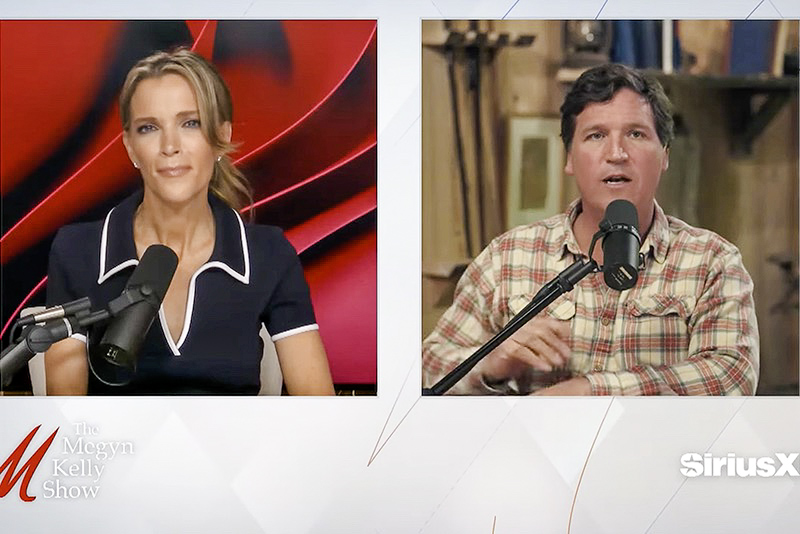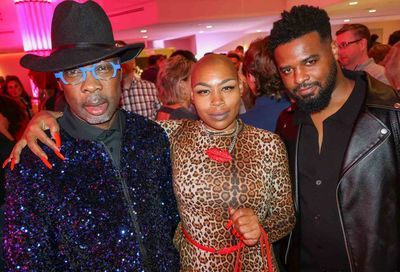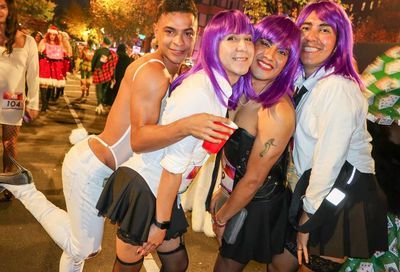Banned from Pride
LGBT members of an anti-gay party have been banned from marching in London's Pride parade

There’s a storm brewing across the pond. This weekend, London will host its annual Pride celebration, where thousands of British queers will parade through the city’s ancient streets. They have plenty to celebrate, too: It’s been over a year since marriage equality was legalized in England and Wales (Scotland followed later that year), and Britain is often voted as the most LGBT-friendly nation in Europe.
But the weekend-long celebrations look set to be overshadowed, and not just by the typically unpredictable British weather. Instead, a political quagmire has formed in the wake of Pride in London’s decision to ban one of the U.K.’s political parties from marching in the parade. Yes, Pride — normally an ode to all things inclusion — is preventing a group of LGBT people from marching together. Why?
In short, they’re members of a party notorious for its homophobic views. The United Kingdom Independence Party (UKIP) is a right-wing party that advocates for the U.K. to leave the European Union. Widely viewed as racist nationalism tempered for the mainstream, the party’s members have frequently come under fire for charged statements against migrants and ethnic minorities when campaigning for votes.
Of course, as with any party filled with right-wing, narrow-minded members — party data suggests UKIP supporters consist mostly of white, older, working-class males with limited higher education — homophobia is rife. PinkNews compiled a list of UKIP members’ various outbursts, including: a candidate calling for “poofters” to be shot to convince others that they should choose to be straight; a party donor claiming that gay people are incapable of love (he also believes women should be banned from wearing trousers); the party’s leader, Nigel Farage, suggesting that it’s okay for older people to be homophobic; and a UKIP councillor who famously claimed that support for gay marriage was the cause of flooding in England.
Indeed, in this year’s national elections, UKIP actively campaigned on an anti-LGBT manifesto, with support for conscience laws that would exempt Christians from adhering to anti-discrimination laws — similar to the recent proliferation of “religious freedom” laws in the U.S. During election debates, Farage also attempted to demonize those with HIV, claiming migrants were coming to the country for treatment and denying hospital resources to British citizens. His opponents openly condemned his statements.
It’s perhaps understandable, then, that when Pride in London released a statement initially saying they wouldn’t prevent UKIP’s LGBT group from marching in the parade, a lot of people were upset.
“We provide a platform for every part of the LGBT+ community and respect the principles of free speech,” Pride in London said in a statement. “We do not discriminate against people based on their political affiliation, and all political parties taking part in the Parade will be positioned together in the same section.”
Shortly after the decision was announced, a petition was drafted calling for UKIP’s members to be banned from marching in the parade. “Nigel Farage, leader of Ukip, clearly does not support the values of acceptance that Pride promotes,” it stated, “and Ukip is an inherently homophobic, transphobic, xenophobic, racist and misogynistic political party.” Veteran LGBT rights campaigner Peter Tatchell demanded that Pride reverse their decision, claiming that the party’s opposition to same-sex marriage, frequent homophobic outbursts, and staunchly anti-equality voting record meant that it shouldn’t be allowed to march alongside the U.K.’s other main parties, all of which support LGBT equality.
Two days later, Pride in London reversed their decision. UKIP’s application to join the parade was turned down, with Pride stating it had made the decision “in order to protect participants and ensure the event passes off safely and in the right spirit,” emphasizing that its decision had “not been made on a political basis.” The parade’s organizers argued that there were concerns for the safety of parade volunteers and fears that angry demonstrators could disrupt proceedings should UKIP be there.
“There is no level of prejudice that is unacceptable as long as it is directed against UKIP,” Nigel Farage wrote in a column for the Daily Express. He noted that his party had been “banned, outlawed in fact” from attending Pride and that he thought the parade “was about standing for tolerance rather than censorship and hate.” Somewhat ironically, Farage then compared the discrimination against his party to the “bigotry and sometimes even racism” experienced by many Brits — conveniently ignoring UKIP’s racist reputation.
London’s Mayor, Boris Johnson, stated that he didn’t agree with Pride’s decision: “I passionately believe in the Pride march and the values of equality it represents and think that all should be allowed to participate.” Even Peter Tatchell, who initially opposed UKIP’s inclusion, has now admitted that he is “struggling” with the ban. “For me, this is a grey, conflicted issue,” he wrote. “I can sympathise with some aspects of both sides of the argument but on balance, for now, the case against UKIP LGBT’s marching in the Pride parade is stronger.”
For its part, LGBT* in UKIP, the party’s LGBT group, intends to march in Sunday’s parade. “Despite this ban, LGBT* in UKIP do plan to show a presence,” the group wrote in a bulletin to members. However, the controversy has inevitably politicized the entire affair. UKIP’s LGBT group no longer wants to march for the sake of showing pride — instead, it wants to do so as a statement of intent: “It is important that we get as many LGBT people from UKIP to attend, as there will be media interest in us.”
Pride in London this year threatens to be overshadowed by a deep split among its revellers, with plenty of opinions on both sides of the UKIP debate. Should LGBT* in UKIP choose to march together, in defiance of Pride’s ban, there’s every chance that it could disrupt what is otherwise supposed to be a joyous celebration. Of course, there is also the argument that, despite their politics, they are still members of the LGBT community — if Pride is for everyone, it really must mean everyone, surely?
After all, the Republican Party is hardly the dictionary definition of inclusion and tolerance — and most gays may oppose their politics — but we’d never ban Log Cabin members from Pride.
Support Metro Weekly’s Journalism
These are challenging times for news organizations. And yet it’s crucial we stay active and provide vital resources and information to both our local readers and the world. So won’t you please take a moment and consider supporting Metro Weekly with a membership? For as little as $5 a month, you can help ensure Metro Weekly magazine and MetroWeekly.com remain free, viable resources as we provide the best, most diverse, culturally-resonant LGBTQ coverage in both the D.C. region and around the world. Memberships come with exclusive perks and discounts, your own personal digital delivery of each week’s magazine (and an archive), access to our Member's Lounge when it launches this fall, and exclusive members-only items like Metro Weekly Membership Mugs and Tote Bags! Check out all our membership levels here and please join us today!

























You must be logged in to post a comment.